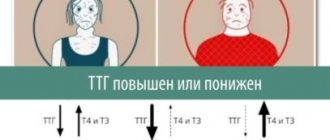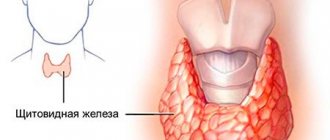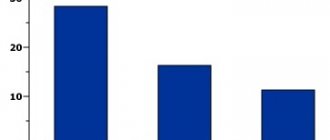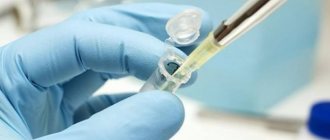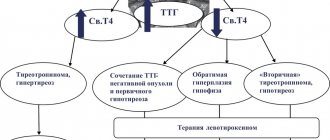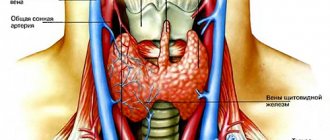Free triiodothyronine (free T3)
What is free triiodothyronine (Free T3, FT3)?
This is a thyroid hormone that stimulates the exchange and absorption of oxygen by tissues. It is produced by the follicular cells of the thyroid gland under the control of thyroid-stimulating hormone. In peripheral tissues it is formed during the deiodination of free thyroxine (T4). Free triiodothyronine is the active part of total triiodothyronine. Triiodothyronine is more active than thyroxine, but is found in the blood in lower concentrations.
Free trioidthyronine:
- increases heat production and oxygen consumption by all body tissues, with the exception of brain tissue, spleen and testicles;
- stimulates the synthesis of vitamin A in the liver;
- reduces the concentration of cholesterol and triglycerides in the blood;
- accelerates protein metabolism;
- increases calcium excretion in urine;
- activates bone tissue turnover (to a greater extent, bone resorption);
- has a positive chrono- and inotropic effect on the heart;
- stimulates reticular formation and cortical processes in the central nervous system.
The level of free triiodothyronine depends on:
- from age (by 11 - 15 years, the concentration of free triiodothyronine reaches the level of adults; over 65 years of age, a decrease in free triiodothyronine in serum and plasma is observed);
- during pregnancy, the value of free trioidthyronine decreases from the 1st to the 3rd trimester; a week after birth, serum free trioidthyronine levels return to normal;
- by gender (women have lower concentrations of free trioidthyronine than men);
- depending on the time of year (the maximum level of free trioidthyronine occurs from September to February, the minimum - in the summer).
Indications for the purpose of analysis:
- differential diagnosis of thyroid diseases;
- control study for isolated T3 toxicosis.
When is the free triiodothyronine level elevated?
- Thyrotropinoma.
- Toxic goiter.
- Isolated T3 toxicosis.
- Thyroiditis.
- Thyrotoxic adenoma.
- T4-resistant hypothyroidism.
- Thyroid hormone resistance syndrome.
- TSH-independent thyrotoxicosis.
- Postpartum thyroid dysfunction.
- Choriocarcinoma.
- Decreased levels of thyroxine-binding globulin.
- Myelomas with high levels of IgG.
- Nephrotic syndrome.
- Hemodialysis.
- Chronic liver diseases.
When is the free triiodothyronine level low?
- Uncompensated primary adrenal insufficiency.
- Severe nonthyroidal pathology, including somatic and mental illnesses; period of recovery after serious illness.
- Primary, secondary, tertiary hypothyroidism.
- Artificial thyrotoxicosis due to self-prescription of T4.
- Low protein and low calorie diet.
- Heavy physical activity in women.
- Loss of body weight.
- Taking amiodarone, large doses of propranolol, x-ray iodine contrast agents.
General information
The follicular cells of the thyroid gland produce and release the T4 hormone into the blood, which has 4 iodine molecules at its base. Peripheral tissues ensure the separation of one molecule from T4, converting it into the more active T3. An additional 20% of the hormone is produced by the gland itself.
In general, T3 is found in the blood plasma, where it is bound by transport proteins (globulins). The remaining 0.5% of the total amount is stored in free form, due to which free T3 (not bound by transporter proteins) performs important functions for the body:
- provides tissues with oxygen and energy, thereby increasing heat production (maintains a normal temperature for the functioning of the body);
- regulates the level of triglycerides and cholesterol in plasma;
- improves calcium excretion by the kidneys;
- accelerates the metabolism of proteins and carbohydrates in the body;
- promotes the production of vitamin A by the liver;
- enhances regeneration and restoration of bone tissue;
- has a positive effect on the heart and brain (stimulates cortical processes);
- participates in the development of the embryo (intrauterine and neonatal stages).
A critical change in the concentration of the T3 hormone not only affects a person’s general well-being, but also leads to an imbalance of other thyroid hormones, triggering processes in the body that are dangerous to health and life.
References
- Hypothyroidism. Clinical recommendations. Association of Endocrinologists of Russia, 2021. - 38 p.
- Federal clinical guidelines for the diagnosis and treatment of thyrotoxicosis with diffuse goiter (diffuse toxic goiter, Graves-Bazedow disease), nodular/multinodular goiter, 2014. - 45 p.
- Encyclopedia of clinical laboratory tests / ed. WELL. Titsa. - M.: Labinform, 1997. - P. 461-465.
- Kumar, V., Abbas, A., Fausto, N. et al. Robbins and Cotran Pathologic Basis of Disease, 2014. - 1464 p.
What will a blood test for thyroid hormones tell you?
When is a thyroid hormone test needed? What will the results tell the doctor? These and other questions are answered by endocrinologist and nutritionist at Clinic Expert Rostov-on-Don Aida Nizamovna Gyulmagomedova.
— Aida Nizamovna, what hormones does the thyroid gland produce?
- There are several of them. These are thyroid hormones (T4 and T3) and calcitonin. I'll tell you a little more about them.
T4 – tetraiodothyronine (levothyroxine) and T3 – triiodothyronine. These hormones contain iodine and are synthesized by the follicular cells of the thyroid gland (thyrocytes). In the blood, thyroid hormones are present in two forms: a free fraction (they have hormonal activity) and a total fraction (associated with transport proteins). Only free fractions of hormones are of clinical significance, and it is by them that the functioning of the thyroid gland is determined.
Calcitonin. Unlike T3 and T4, it does not contain iodine. Produced by parafollicular cells (C cells). Calcitonin is not a marker of thyroid function, but is very important and acts as a clear marker for suspected medullary thyroid cancer. Therefore, the determination of this hormone in the blood is indicated for all people who have nodules in the thyroid gland.
Read materials on the topic:
How to determine that the body does not have enough iodine? The knot will be tied, the knot will be untied. How dangerous are thyroid nodules?
— What functions do thyroid hormones perform in the body?
“They affect almost all organs and tissues of our body. This includes normal metabolism, the functioning of the digestive system, maintaining motor activity, normal mental state, and heart rhythm. The most significant effects of these hormones include the following:
- control of metabolic processes,
- formation of heat and sweat,
- increased breakdown of fat cells and destruction of proteins,
- normal growth and development of bones,
- normal development of the brain (central nervous system),
- increased absorption of carbohydrates,
- stimulating the formation of LDL (low-density lipoprotein. This is the so-called “bad cholesterol”, which forms atherosclerotic plaques in our vessels),
- increasing metabolic rate.
In children with a lack of thyroid hormones, a decrease in intelligence is observed and cretinism develops (lag in brain development).
— In what cases does the doctor refer the patient to take tests for thyroid hormones?
— Most often, the following situations are indications for such tests. First: suspicion of a lack of thyroid hormones - in medical parlance this is called hypothyroidism. In this case, the patient may be concerned about:
- weakness,
- fast fatiguability,
- depressed mood, even depression,
- decreased memory, concentration,
- joint pain,
- high blood pressure,
- cold intolerance,
- drowsiness,
- dry skin,
- hair loss,
- weight gain or inability to lose weight,
- decreased libido,
- constipation,
- in women - menstrual irregularities.
In advanced cases, the skin becomes yellowish.
Read more about hypothyroidism here
Further. The doctor may refer the patient for tests if they suspect excess production of thyroid hormones (hyperthyroidism). The following signs are typical for this condition:
- cardiopalmus,
- increased blood pressure,
- unmotivated weight loss,
- sweating,
- irritability,
- trembling in the body,
- tremor (shaking) of the upper extremities, increased frequency and looseness of bowel movements.
Female infertility or delayed conception may also occur.
Learn more about hyperthyroidism here
In addition, hormone levels are determined if goiter is suspected. If, during an examination of a patient, a doctor sees an enlarged thyroid gland (or the person himself notices this), and upon palpation (feeling) some nodular formations are discovered, it is necessary to check the hormones.
And finally, when a patient has undergone surgery related to the thyroid gland, he must undergo tests such as thyroid-stimulating hormone and free T4.
— For what reasons can the level of thyroid hormones change?
- The reasons are different. I will name the most common of them.
Diffuse toxic goiter (Graves' disease, also known as Graves' disease). What happens? Due to disruption of the immune system, antibodies to TSH (thyroid-stimulating hormone) receptors located in the thyroid gland begin to form. As a result, the gland increases in size (a goiter appears), synthesizing a large amount of hormones.
Toxic adenoma of the thyroid gland. This nodular neoplasm also produces an excess amount of hormones (the cause of its development is unknown).
Destructive thyrotoxicosis - the amount of hormones increases due to their sharp release against the background of inflammation of the gland.
And, in fact, drug-induced thyrotoxicosis - when the hormone levels increase due to an overdose of thyroxine drugs in the treatment of hypothyroidism.
One of the most common causes of low thyroid hormone levels is autoimmune thyroiditis (AIT). What it is? The immune system begins to produce antibodies that attack the gland. As a result, the gland becomes inflamed, its cells are destroyed, and the amount of hormones produced decreases.
Read material on the topic:
Particular inflammation. What is autoimmune thyroiditis?
— Do I need to prepare for a thyroid hormone test? Are there any differences in training for men and women?
— The secretion of many hormones, including thyroid hormones, is subject to fluctuations during the day. There are general rules when preparing for hormone tests. The following conditions must be met. This test is taken on an empty stomach (last meal at least 12 hours before donating blood). Blood is drawn before 10 a.m. Smoking and stress are excluded the day before and on the day of the test. As for gender differences, in fact, there are none: the rules are the same for both men and women.
— Why, in addition to testing for thyroid hormones, do doctors also recommend testing for the pituitary hormone TSH? What is it for?
— Regulation of the thyroid gland occurs according to the principle of negative feedback. The secretion of thyroid hormones is strictly controlled by thyroid-stimulating hormone (TSH), which is produced in the pituitary gland. The TSH level helps to draw conclusions about the dysfunction of the thyroid gland.
More articles about tests can be found in our laboratory diagnostics section
You can sign up and get tested here You can make an appointment with an endocrinologist here ATTENTION: services are not available in all cities
Interviewed by Igor Chichinov
The editors recommend:
Myths and truth about thyroid diseases When is an ultrasound of the thyroid gland necessary? “Not just ultrasound.” What are the capabilities of MRI of the thyroid gland?
For reference:
Gulmagomedova Aida Nizamovna
Endocrinologist, nutritionist, member of the Russian Association of Endocrinologists, member of the Association of Endocrinologists of the Rostov Region.
Receives at the address: Rostov-on-Don, st. Krasnoarmeyskaya, 262.
T3 hormone test
When determining pathological conditions of the thyroid gland, the endocrinologist necessarily sends the patient to take tests for three hormones - T4, TSH, T3. Testing for the latter type of hormone is extremely important, as it allows minimizing diagnostic error.
For example, with nodular toxic goiter, very often independently working nodes are engaged in the reproduction of the T3 hormone. Its amount also increases in diffuse toxic goiter, Graves' disease and Graves' disease. If the analysis produces a result that shows a significant increase in triiodothyronine, then doctors talk about T3 toxicosis. This condition is difficult to correct with drugs and manifests itself with more vivid symptoms than those found with an increase in the amount of the T4 hormone.
Indications for analysis
The study is prescribed by an endocrinologist or general practitioner in the following situations:
- in the program of differential diagnosis of various hyperthyroid conditions (related to thyroid hormones);
- to control hormone levels in case of established T3 toxicosis (critically increased concentration of T3 in the blood);
- to assess the effectiveness of hormone replacement therapy;
- to clarify test results that showed a reduced level of another thyroid hormone (TSH) with a normal concentration of free T4.
In other cases, an independent test for free triiodothyronine has no diagnostic value.
Total T3 is elevated
A high concentration of the hormone in the blood indicates various forms of thyrotoxicosis, which is accompanied by a fairly clear clinical picture:
- increased nervousness, aggression, frustration, emotional instability;
- sleep disorders (insomnia, frequent awakenings);
- severe fatigue, loss of strength;
- trembling of fingers, hands (tremor);
- arrhythmia (irregular heartbeat), extrasystole (additional myocardial contractions);
- rapid heart rate (tachycardia);
- sudden and causeless weight loss;
- frequent urge to urinate;
- indigestion (diarrhea);
- fever (rare);
- menstrual irregularities;
- enlargement of the mammary glands in male patients.
An increase in total T3 concentration against the background of normal levels of other thyroid hormones is considered a false positive result.
A true excess of the norm indicates the following pathologies:
- Graves' disease (an autoimmune disease that leads to poisoning of one's own thyroid hormones);
- isolated T-thyrotoxicosis or TSH-independent thyrotoxicosis;
- hyperthyroidism;
- thyroiditis (inflammation of the thyroid gland of an autoimmune nature);
- dysfunction of the thyroid gland after childbirth;
- thyroid adenoma;
- nephrotic syndrome (kidney damage accompanied by increased tissue swelling);
- resistance to thyroid hormones;
- Pendred syndrome (genetically caused enlargement of the thyroid gland).
Detailed description of the study
Normally, the thyroid gland, under the influence of the pituitary thyroid-stimulating hormone (TSH), synthesizes two hormones that affect the metabolism of the entire body: T3 (triiodothyronine) and T4 (thyroxine). The difference between them is that the first hormone contains three iodine molecules, and the second - four.
The biological activity of T3 is 3-4 times higher than T4. Both hormones enter the blood and circulate in it independently (free fraction) or by combining with blood plasma proteins. This study reveals the concentration of total T3 in the blood.
Total T3 is the total indicator of hormone fractions bound and unbound to plasma proteins in the blood. Most bound T3 is transported by albumins, prealbumins, and to a lesser extent by a special protein, thyroxine-binding globulin. Unbound (free) T3 molecules have greater biological activity than bound fractions.
The main functions of the T3 hormone include:
- Regulation of protein, fat and carbohydrate metabolism;
- Supports the physiological functioning of the heart (heart rate, blood pressure);
- Regulation of energy metabolism (acceleration of basal metabolism, maintaining body temperature);
- Participation in growth and development, especially in children: T3 accelerates growth, promotes the development of cognitive functions.
The physiological level of the hormones T3 and T4 (together with TSH) ensure optimal functioning of the thyroid gland - this condition is called “euthyroidism”. Disruption of the thyroid gland is accompanied by an increase (hyperthyroidism) or a decrease, and sometimes a complete loss of its function (hypothyroidism). Hypothyroidism and hyperthyroidism are nonspecific syndromes and can occur against the background of various diseases of the thyroid gland and the hypothalamic-pituitary system.
Symptoms of hypothyroidism may include:
- General weakness, drowsiness;
- Constipation (constipation);
- Slow heart rate (bradycardia);
- swelling of the face, limbs or trunk;
- Sensation of a “foreign body” in the neck due to an increase in the volume of the thyroid gland;
- Difficulty breathing and/or swallowing due to an increase in the volume of the thyroid gland;
- Delayed mental and physical development in children and sexual development in adolescents.
Signs of hyperthyroidism include:
- Headache;
- Anxiety, nervousness;
- Increased sweating;
- Rapid heart rate (tachycardia);
- High fatigue;
- Diarrhea;
- Sleep and eating disorders.
Determining the concentration of T3 in the blood, especially together with identifying the levels of T4 and TSH, makes it possible to establish a dysfunction of the thyroid gland and begin timely treatment.
Indications
Data on the level of triiodothyronine are used for differential (comparative) diagnosis of thyroid diseases, as well as for monitoring the hyperthyroid state (excessive production of endocrine hormones).
In addition, a general T3 test is a mandatory part of screening (comprehensive examination for hormones) of the thyroid gland in the following cases:
- dysfunction of the thyroid gland or pituitary gland;
- sudden change in body weight without established reasons;
- increased tendency to tissue swelling;
- menstrual cycle disorders in women;
- painful menstruation;
- pronounced symptoms of PMS.
With nodular toxic, diffuse goiter, as well as thyroid adenoma, formations may appear that additionally produce triiodothyronine, which leads to T3 toxicosis. In this case, the hormone level is analyzed to assess the effectiveness of the treatment.
Norm of T3 hormone
The norm of total hormone T3:
| Age | Norm in Nmol/l | Norm in ng/dl | Norm in ng/ml |
| 4 months | 1,23 — 4,22 | 80 — 275 | 0,80 — 2,75 |
| 4 months - 1 year | 1,32 — 4,07 | 86 — 265 | 0,86 — 2,65 |
| 17 years | 1,42 — 3,80 | 92 — 247 | 0,92 — 2,47 |
| 7 – 12 years | 1,43 — 3,55 | 93 — 231 | 0,93 — 2,31 |
| 12 – 20 years | 1,40 -3,34 | 91 — 217 | 0,91 — 2,17 |
| 20-50 years | 1,2 — 3,1 | 78 — 201 | 0,78 — 2,01 |
| 50 years | 0.62 to 2.79 | 40 — 181 | 0,40 — 1,81 |
To convert total T3 from nmol/L to ng/mL, multiply the number by 0.651: (nmol/L) x 0.651 = ng/mL.
To convert ng/ml to nmol/l, multiply the number by 1.536: (ng/ml) x 1.536 = nmol/l.
The norm of free hormone T3:
| Age | Floor | Norm in pmol/l | Norm in pg/ml |
| In the first year | Both | 3,5 – 7, 35 | 2,28 – 7,78 |
| 1 – 12 years | 4,1 – 6,5 | 2,67 – 4,23 | |
| 12 – 16 years old | Man | 4,3 – 6,8 | 2,8 – 4,43 |
| Woman | 3,7 – 6,3 | 2,4 – 4,1 | |
| 16 – 18 years old | Man | 3,4 – 6,2 | 2,21 – 4,04 |
| Woman | 3,7 – 5,7 | 2,4 – 3,71 | |
| 18 years | Both | 2,5 – 5,7 | 1,63 – 3,71 |
If the values on your form are indicated in pg/ml, then simply multiply them by 1.536: (pg/ml) x1.536 = pmol/l. To convert the numbers the other way around: (pmol/l) x0.651 = pg/ml.
It must be said that these standards may differ from those that you receive in the laboratory. The fact is that, depending on what equipment the hormone test is performed on, the normal values will vary. Each specific laboratory makes a choice in favor of one or another apparatus and set of reagents. Therefore, the quantity will be considered normal if the results obtained fall within the reference limits indicated on a specific form from a particular laboratory.


